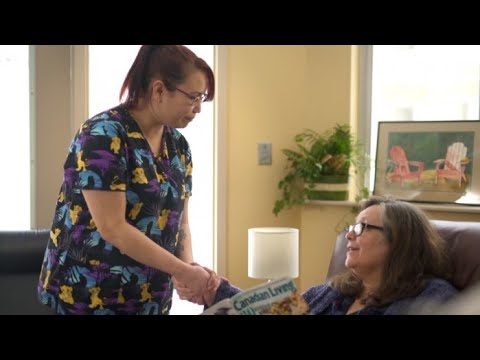Career Overview
In B.C., home support workers are known as community health workers. They are health care assistants (HCAs) that work in people’s homes. There, they provide personal care for seniors, people with disabilities and people recovering from illness or accident.
Job Titles
Duties
Community health workers:
- Provide care and company to people recovering from illness or facing other health issues
- Help clients with daily personal care, like bathing, dressing and grooming
- Keep track of medications
- Plan and prepare meals and special diets, and feed or assist in feeding clients
- Work under the direction of a supervisor or nurse
- Report changes in clients’ behaviour and condition
- Help clients with movement and transport
- May perform routine health-related duties such as changing non-sterile dressings, assisting in the administration of medications and collecting specimens under the general direction of home care agency supervisor or nurse
- May perform routine housekeeping duties such as laundry, washing dishes and making beds
Community health workers may also do health- and safety-related housekeeping tasks like laundry, dishes and making beds. In addition, they may plan and make meals that fit their client’s diet. Under the direction of a supervisor or nurse, they may also do routine health-related tasks. These can include changing non-sterile dressings, giving medications and collecting specimens.
Earnings
Earnings is income that workers receive in exchange for their labour. Depending on the type of employment, earnings can be in the form of wages (hourly), salaries (fixed monthly or annual) or self-employed earnings.
Work Environment
# Workers Employed
6,820% Employed Full Time
46%Community health workers usually work on their own in clients’ homes, with occasional visits from their supervisor. Many community health workers work part time and on weekends.
Community health workers usually work with a number of clients, and often visit four or five homes on the same day. They may work with a particular client for just a few hours, or they may go to the same home every day for months or years.
Community health workers use technology, including smartphone apps, to record client information and organize work schedules.
Career Pathways
New community health workers usually begin working on a casual basis for one or more employer. They then move into permanent positions with a private organization or public health authority. Some community health workers are self-employed.
Those who prefer to work in care facilities or hospitals rather than in people’s homes can become care aides.
With additional education and certification, community health workers can become licensed practical nurses (LPNs). From there, they can become registered nurses (RNs).
Occupational Interests
It’s important to understand what kinds of occupations align with your interests.
For more about occupational interests visit Skills for the Future Workforce > Characteristics.
Here are the top occupational interest(s) for this career profile:
Education, Training and Skills
- Some secondary school education is usually required
- Home management experience may be required
- College or other courses in home support may be required
- First aid certification may be required
- Completion of a training program in care of the elderly, care of persons with disabilities, convalescent care or in a related field may be required
Most community health worker jobs require certification as a health care assistant (HCA).
To be certified as an HCA, community health workers must:
- Undergo a criminal record check and a tuberculosis screening
- Complete a recognized six- to nine-month HCA program
- Complete CPR, FOODSAFE and first-aid certification
- Register with the B.C. Care Aide and Community Health Worker Registry
- Have a valid B.C. driver’s licence and a reliable car
Community health workers may also need:
- Workplace Hazardous Materials Information System (WHMIS) training
- Violence prevention training
- Mental health first-aid training
Education programs in B.C.

Top Skills
Every job calls for a certain set of skills. Knowing those skills is the first step in finding a good career fit.
Here, you will find the 10 most relevant workplace skills. Some are more important to achieving success in a certain career than others. These skills may come naturally to you or you may need to gain them through education, training and experience.
See the list of work-related skills below, ranked in order of importance for this career. Check out the list and see if this career matches your skills—take that first step!
Actively looking for ways to help people.
Being aware of others’ reactions and understanding why they react as they do.
Giving full attention to what other people are saying, taking time to understand the points being made, asking questions as appropriate, and not interrupting at inappropriate times.
Using logic and reasoning to identify the strengths and weaknesses of alternative solutions, conclusions or approaches to problems.
Keeping track of and assessing your performance, other individuals, or organizations to make improvements or take corrective action.
Understanding written sentences and paragraphs in work-related documents.
Talking to others to share information effectively.
Adjusting actions in relation to others' actions.
Managing one’s own time and the time of others.
Teaching others how to do something.
Labour Market Statistics
Discover data, facts and information that have been gathered and analyzed. Learn about the characteristics of the economy and labour market in B.C.
Employment
Find out about employment types and trends by region and industry.
Employment
6,820Employment by Region







| Region | Employment | % Employment of this Occupation |
|---|---|---|
| Cariboo | 190 | 2.8% |
| Kootenay | 245 | 3.6% |
| Mainland/Southwest | 3,590 | 52.6% |
| North Coast and Nechako | 135 | 2.0% |
| Northeast | 95 | 1.4% |
| Thompson-Okanagan | 775 | 11.4% |
| Vancouver Island/Coast | 1,780 | 26.1% |
Labour Market Outlook
The B.C. Labour Market Outlook is a 10-year forecast of the expected supply and demand for labour in the province. It’s usually updated every year. The purpose is to provide British Columbians with the knowledge to make informed decisions on careers, skills training, education and hiring.
Forecasted Job Openings (2025-2035)
4,210Forecasted Job Openings
Forecasted Employment Growth Rate
Composition of Job Openings
Job Openings by Region (2025-2035)







| Region | Job Openings | Avg. Annual Employment Growth |
|---|---|---|
| Cariboo | 90 | 1.4% |
| Kootenay | 150 | 1.7% |
| Mainland/Southwest | 2,230 | 1.9% |
| North Coast and Nechako | 60 | 1.3% |
| Northeast | 50 | 1.1% |
| Thompson-Okanagan | 470 | 2.0% |
| Vancouver Island/Coast | 1,150 | 2.1% |
Industry Highlights
Learn about the opportunities in B.C.'s major industries, including employment trends, earning potential, locations of work and more.
Forecasted Job Openings by Industry
| Industry | Job Openings (2025-2035) |
|---|---|
| Health Care and Social Assistance | 3,690 |
| Repair, Personal and Non-Profit Services | 330 |
| Public Administration | 30 |
| Business, Building and Other Support Services | 30 |
| Professional, Scientific and Technical Services | 30 |
Insights from Industry
Elderly people often don’t need the full services of a hospital, but need support in order to stay in their homes. There is also growing agreement that people with complex health issues can be better treated at home. This has become more possible as portable medical equipment is made for in-home use.
As a result, the role of the community health worker has grown and changed. The job now focuses more on personal care and health-related duties, such as giving medicine under the direction of a nurse. At the same time, there is less focus on household-related tasks, such as cooking and cleaning.
Community health workers have many job opportunities across the province. But care aides–those health care assistants (HCAs) who work in facilities rather than private homes–usually earn more money and have more job security. Because of this, graduates of HCA programs often choose to work as care aides instead of community health workers. But improvements, including increasing wages for unionized workers, are making the role of community health worker more attractive.
Resources
-
BC Care Aide & Community Health Worker Registrywww.cachwr.bc.ca
-
BC Health Care Assistantswww.choose2care.ca
-
BC Seniors’ Guidewww2.gov.bc.ca/gov/content/family-social-supports/seniors/about-seniorsbc/seniors-related-initiatives/bc-seniors-guide
-
Fraser Healthwww.fraserhealth.ca/
-
Health Match BCwww.healthmatchbc.org/
-
Interior Health – Jobsjobs.interiorhealth.ca/
-
Island Healthwww.islandhealth.ca/
-
Northern Health – Careerscareers.northernhealth.ca/
-
Provincial Health Services Authority (PHSA) – Jobsjobs.phsa.ca/
-
Seniors First BCseniorsfirstbc.ca
-
Vancouver Coastal Health (VCH)www.vch.ca/








